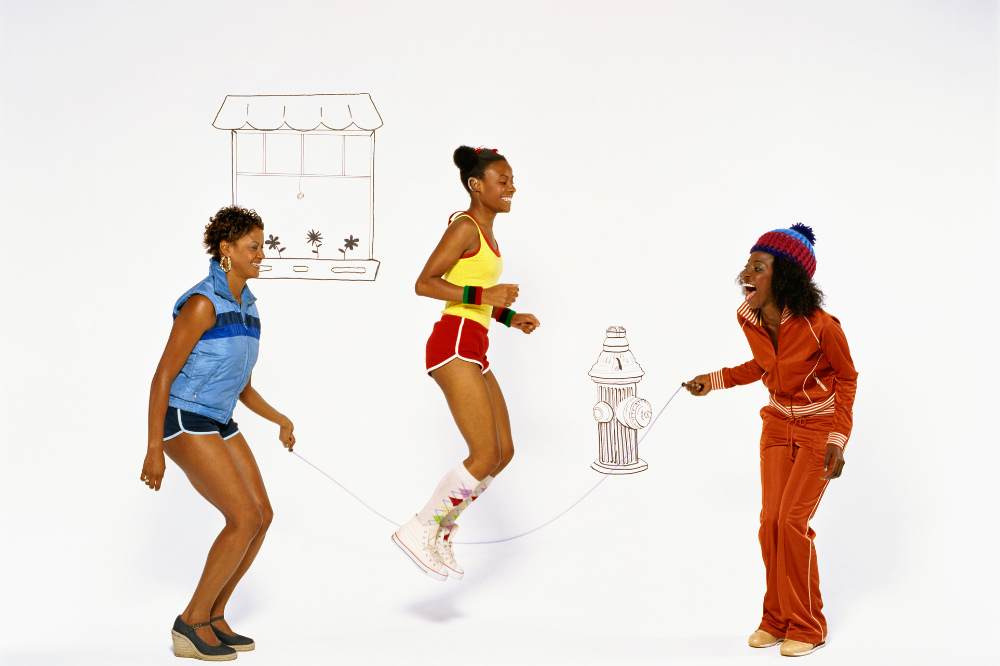Growing up in Harlem, New York, I developed a deep love for double dutch, a popular jump rope game that requires skill, timing, and adaptability. Little did I know at the time that my childhood passion would serve as a perfect analogy for entrepreneurship. Building a business, like jumping double dutch, is a journey of development and growth. In this blog post, we’ll explore how the art of double dutch relates to the world of entrepreneurship. These connections are particularly relevant to the work we do at Sistahbiz, providing Black women entrepreneurs with the knowledge, tools, and community support needed to master their business numbers, craft effective business plans, and achieve sustainable success.
Skill and Mastery:
As I grow in business, I get energized by the deep learning. The aha moments and the pivots that come with them are what I live for and hope to inspire other entrepreneurs to embrace. Just as in double dutch, where jumpers must learn the ropes, the moves, and the timing, entrepreneurs must hone their skills to build a successful business. CEOs must practice and develop skills such as data analysis, strategic business planning, resource and stakeholder management. Mastery of these skills is crucial for achieving success in both realms.
Timing and Fear:
She’s “scared of the ropes” is what we would say when someone goes to jump in the rope, and pulls back due to fear, missing the opportunity to jump in. In double dutch, timing is everything, but there’s also the fear of jumping in the rope and potentially missing the right moment. Similarly, entrepreneurs must overcome their fears and have a keen sense of timing in the business world. Knowing when to enter the market, launch a product, or make critical decisions can make all the difference between success and failure. More importantly, building confidence and overcoming fear is what helps to close the knowing-doing gap.
Adaptability and Learning Cycles:
Growing up, we jumped all day, every day – for hours. We stayed hustling to get rope from the telephone man and find enough people to play (you need two turners). We spent all of that time constantly adjusting and getting better. Double dutch involves adapting to the changing rhythm of the ropes, much like how entrepreneurs must be flexible and adaptable in response to market shifts, customer preferences, and unexpected challenges. Sistahbiz labs help founders achieve this by implementing learning cycles like Plan-Do-Study-Act (PDSA) or similar approaches. These cycles enable founders to continuously gather customer feedback, make data-driven improvements, and stay ahead of the curve in their businesses.
Teamwork and Double-Turning:
“Nobody wants the double-turner.” Double dutch is often a team sport, requiring coordination between jumpers and turners. Good turners are everything. In entrepreneurship, low performers can break the business, just as in double-turning, where a turner turning off-beat can affect the entire team. Effective alignment, collaboration and communication among co-founders, employees, or strategic partners are essential for achieving success.
Persistence and Endurance:
On average, a person weighing around 155-160 pounds can burn approximately 300-400 calories in just 30 minutes of moderate-intensity rope jumping. Plus, double dutch involves more complex moves and often requires higher levels of coordination and teamwork compared to single rope jumping. Both jumping double dutch and building a business are physically and mentally demanding endeavors. They require determination and the willingness to keep trying, even in the face of obstacles or setbacks. Entrepreneurs must be physically fit and emotionally confident to endure the cycles of testing and learning, trials, and challenges while managing and leading a variety of stakeholders and responsibilities.
Creativity and Innovation:
Whether we did flips in the rope, pop-up turns or fancy footwork, we always wanted to stand out and do something different to win. Double dutch competitions are often won based on the risks taken to execute tricks and moves. Similarly, in entrepreneurship, success hinges on creativity and innovation. Entrepreneurs must continually take calculated risks, find new solutions to problems, and create unique value propositions in the market to stay competitive.
Enjoyment and Passion:
People who excel at double dutch often do it because they genuinely enjoy it. Similarly, successful entrepreneurs are often passionate about their business ventures. I’m in love with the game of business. So it’s easier to show up on hard days and reset when I fall. I see too many founders who are just in love with the idea of the freedom it can bring, but not the struggle and growth and stretching in pursuit of mastery. Interested but not committed. They fall in love with social media posts about 7-figure, passive income lifestyles but not the years of development to build something sustainable and predictable. Loving the game of entrepreneurship provides the motivation and energy needed to overcome challenges and persist through the ups and downs of the entrepreneurial journey.
At Sistahbiz, success comes to our members because they attend our labs and workgroups. They are building CEO skills, committed to mastery and adaptability, learning in quick cycles, embracing teamwork, conquering their fears, maintaining physical fitness and emotional confidence, taking creative risks, and above all, loving the game of entrepreneurship.

